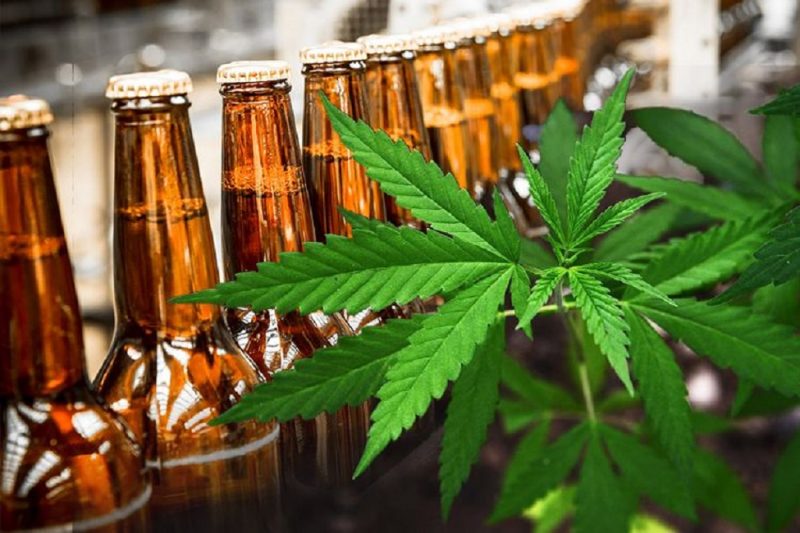Survey: Cannabis consumption leads to reduced alcohol consumption
Alcohol and cannabis are among the most high demand industries, despite alcohol having a head start. Each year, almost 100,000 people in the U.S. die from alcohol-related health conditions; whereas cannabis has not been proven to cause any fatal overdoses. Nonetheless, alcohol is widely available around the world, while cannabis remains an illegal substance across much of the globe.
Despite the popularity of the alcohol industry, it seems that many frequent drinkers are now swapping a beverage for medical cannabis. This theory was met after the results of a national, cross-sectional study called the “Canadian Cannabis Patient Survey of 2019” were recently published.
Tilray – a Canadian cannabis and pharmaceutical company – sponsored the survey on cannabis’ influence on alcohol consumers. The findings were compiled by the authors of a new paper featured in the “International Journal of Drug Policy”.
“Reductions in alcohol use following medical cannabis initiation: Results from a large cross-sectional survey of medical cannabis patients in Canada,” were the words of the paper’s authors — Lucas, who divulged the survey results alongside colleagues Susan Boyd, M-J Milloy and Zach Walsh.
Outcome of survey on cannabis’ influence on alcohol consumers could have widespread implications
The researchers who carried out this survey on cannabis’ influence on alcohol intake showed that almost half (44 percent) of participating patients who reported enjoying regular glasses of alcohol prior to becoming a cannabis consumer managed to successfully reduce drinking once they were exposed to the green plant.
Despite these findings, the researchers stressed the fact that reduced alcohol intake after cannabis consumption did not prove that the medicinal plant is a surefire way to minimize alcohol cravings. They also noted how there is less being done to assess the reasons why alcohol is harming, whereas something always seems to be cropping up in the news regarding the potential dangers of cannabis — a federally illegal plant in the U.S.
However, this is not to say that cannabis is harm-free, with the researchers stating that the plant – when smoked – may increase the risk of lung disease and road safety issues.
On the other hand, they say that trading alcohol for cannabis would be beneficial. After all, alcohol can severely damage every organ in the body and has hundreds of unique diagnostic categories of serious or fatal diseases. Comparatively, cannabis falls into four or five diagnostic categories of disease.
“For years, it was believed that cannabis and alcohol were complements and that people co-used these substances, because a lot of the time when we examined problematic use patterns, these two would go together,” says PhD candidate at the University of Victoria and vice-president of global patient research and access at Tilray, Philippe Lucas. “But, more and more, as we put the pieces together, we’re seeing that cannabis products can be used as safer substitutes instead.
He added that the evidence to suggest that cannabis reduces alcohol intake is growing, in addition to the fact that binge drinking can potentially be avoided if people start swapping drinks for joints.
Cannabis could be considered as a substitute for alcohol in managed alcohol programs
Although the results of this study indicate that people who consume alcohol may be more likely to quit after using cannabis, this conclusion is not definitive; currently, it’s more of a theory. Nonetheless, future research could clarify whether or not the plant harnesses the power to encourage a substance switch.
The drama that proliferated since COVID-19 spread across the U.S. has certainly slowed things down. Tim Stockwell will vouch for this. A scientist and professor in the department of psychology at the Canadian Institute for Substance Use Research at the University of Victoria, Stockwell was keen to further explore the efficacy of using cannabis-infused drinks as alcohol substituted in managed programs. However, a highly-anticipated study of his was put on the backburner once the coronavirus pandemic blew up.
While there is no end to the virus outbreak in sight, Stockwell maintains that the cannabis plant could – at some point in the future – be welcomed in controlled alcohol program environments. The scientist and professor was previously collaborating with UVic colleague Dr. Bernie Pauly to prepare the postponed study. When the study eventually resumes, both expect positive results — mainly due to the convincing consultations that Stockwell has had with caregivers and patients.










